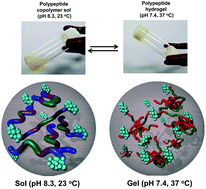A pH- and temperature-responsive bioresorbable injectable hydrogel based on polypeptide block copolymers for the sustained delivery of proteins in vivo
Abstract
Sustained delivery of protein therapeutics is limited owing to the fragile nature of proteins. Despite its great potential, delivery of proteins without any loss of bioactivity remains a challenge in the use of protein therapeutics in the clinic. To surmount this shortcoming, we report a pH- and temperature-responsive in situ-forming injectable hydrogel based on comb-type polypeptide block copolymers for the controlled delivery of proteins. Polypeptide block copolymers, composed of hydrophilic polyethylene glycol (PEG), temperature-responsive poly(γ-benzyl-L-glutamate) (PBLG), and pH-responsive oligo(sulfamethazine) (OSM), exhibit pH- and temperature-induced sol-to-gel transition behavior in aqueous solutions. Polypeptide block copolymers were synthesized by combining N-carboxyanhydride-based ring-opening polymerization and post-functionalization of the chain-end using N-hydroxy succinimide ester activated OSM. The physical properties of polypeptide-based hydrogels were tuned by varying the composition of temperature- and pH-responsive PBLG and OSM in block copolymers. Polypeptide block copolymers were non-toxic to human embryonic kidney cells at high concentrations (2000 μg mL−1). Subcutaneous administration of polypeptide block copolymer sols formed viscoelastic gel instantly at the back of Sprague-Dawley (SD) rats. The in vivo gels exhibited sustained degradation and were found to be bioresorbable in 6 weeks without any noticeable inflammation at the injection site. Anionic characteristics of hydrogels allow efficient loading of a cationic model protein, lysozyme, through electrostatic interaction. Lysozyme-loaded polypeptide block copolymer sols readily formed a viscoelastic gel in vivo and sustained lysozyme release for at least a week. Overall, the results demonstrate an elegant approach to control the release of certain charged proteins and open a myriad of therapeutic possibilities in protein therapeutics.



 Please wait while we load your content...
Please wait while we load your content...